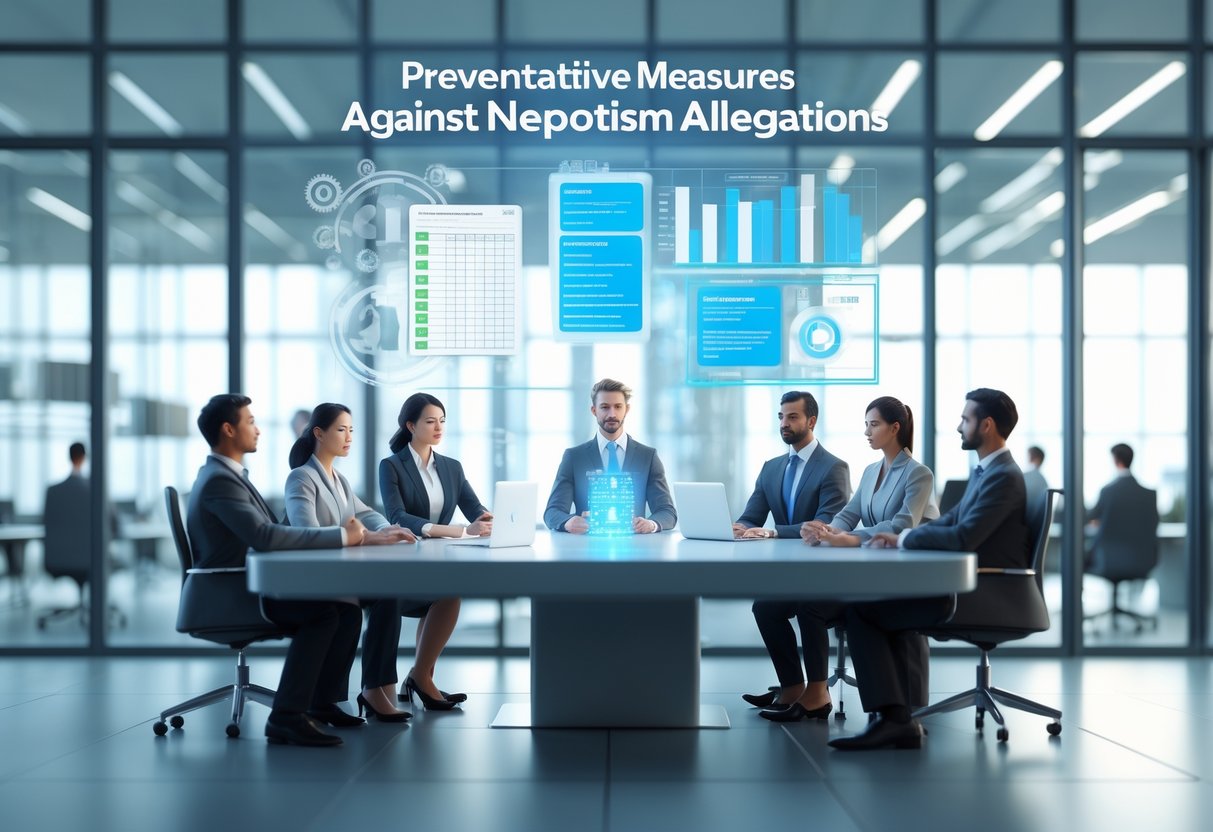Nepotism Allegations: Key Facts, Legal Impacts, and Investigations
Updated On: November 13, 2025 by Aaron Connolly
Understanding Nepotism Allegations
Nepotism allegations pop up when employees feel someone got a leg up at work just because of personal or family ties. You’ll see this come up a lot during hiring, promotions, or when managers hand out the best assignments to their own relatives or friends.
Definition and Scope of Nepotism
Nepotism basically means giving jobs or perks to family or friends instead of picking the person who’s best for the job. People in power use their influence to give others unfair advantages at work.
Common forms of nepotism include:
- Hiring relatives over more qualified candidates
- Promoting family members faster than others
- Handing friends the best work assignments
- Letting relatives slide on disciplinary issues
Private companies don’t break the law just by hiring family. Bosses can pick relatives, even if someone else is more qualified. But it crosses a legal line if it leads to discrimination against protected groups.
Federal laws shield workers from discrimination based on things like race, color, religion, sex, national origin, age, or disability. If nepotism blocks opportunities for people in these groups, that’s when it becomes a legal problem.
Common Situations Leading to Allegations
Certain situations at work tend to spark nepotism allegations. If you know what to watch for, it’s easier to spot when favoritism goes too far.
Hiring decisions get the most complaints. If a manager hires a relative who’s less qualified than other applicants, coworkers often call it out.
Promotion patterns can look suspicious too. When family members keep climbing the ladder faster than others, especially without obvious reasons, people start to grumble.
Work assignments can also cause problems. If relatives always snag the best projects or shifts while more experienced folks get passed over, resentment builds up fast.
Disciplinary inconsistencies are another warning sign. If management lets mistakes slide for family but punishes others for the same thing, accusations usually follow.
Differences Between Family and Non-Family Favouritism
Nepotism usually means family favoritism, but in today’s workplaces, it often extends to friends and close connections. The difference matters when you’re looking at these accusations.
Family nepotism is about blood relatives or spouses getting special treatment. Think parents hiring kids, siblings promoting each other, or in-laws getting a pass.
Cronyism is favoritism toward friends or associates instead of family. If a manager keeps promoting their buddies from the golf course, that’s classic cronyism.
Both create similar headaches at work, but family nepotism is usually easier to spot. Friendships can form naturally at work, so cronyism can be trickier to prove than family ties.
The legal implications don’t really change based on the relationship. Courts care about whether favoritism led to discrimination against protected groups, not whether the person was a cousin or a college buddy.
Legal Framework Governing Nepotism

Federal laws spell out who can hire relatives and when it’s allowed. The Civil Service Reform Act of 1978 made nepotism a prohibited personnel practice, and specific regulations lay out which family members count as relatives.
Overview of Prohibited Personnel Practices
The Civil Service Reform Act of 1978 put nepotism on the list of prohibited personnel practices—number 7, to be exact. You’ll find this in 5 U.S.C. § 2302(b).
These practices protect the government’s merit system. Officials can’t make hiring decisions based on personal ties instead of qualifications.
The U.S. Merit Systems Protection Board makes sure everyone follows these rules. If someone breaks nepotism laws, they violate federal employment standards.
Key elements include:
- Hiring based on merit, not family ties
- Preventing conflicts of interest
- Maintaining public trust in government
- Ensuring fair employment practices
Relevant Federal Laws and House Rules
Federal law 5 U.S.C. § 3110 stops federal officials from appointing relatives to jobs they control. That includes Members of Congress and their hiring authority.
The law spells out exactly who counts as a relative:
- Parents, children, siblings
- Aunts, uncles, first cousins
- Spouses and in-laws
- Step-relatives and half-siblings
House Rule 23 adds more restrictions for Congress. The 107th Congress said Members can’t keep spouses on the payroll.
Members have to certify each employee’s relationship on monthly payroll forms. They can’t hire relatives for their own staff or committees they chair.
State laws are all over the map:
- Some states ban any relative hiring
- Others allow it if you disclose it
- Many focus on whether someone directly supervises a family member
Exceptions and Special Circumstances
Some situations let relatives work together legally. If someone already worked there before the relationship started, grandfather clauses usually protect them.
If an employee marries into a Member’s family after getting hired, they usually get to stay. The big exception is spouses—they have to leave if they marry a Member.
Committee leadership changes can complicate things. If a Member becomes chair of a committee where their relative already works, the relative can stay but can’t get promoted or get raises.
Common exceptions include:
- Employment before the relationship existed
- Cost-of-living adjustments for current employees
- Changing from part-time to full-time
- Campaign workers (federal rules don’t cover them)
Private employers don’t face as many legal limits. Most discrimination laws don’t care about family hiring unless it affects protected groups.
Hiring Processes and Risks of Nepotism

Bad hiring practices make it easy for nepotism claims to pop up, hurting morale and even creating legal headaches. If you understand merit-based systems and know when personal relationships cross the line, you can keep hiring fair.
Merit-Based Recruitment Principles
Merit-based hiring means you focus on skills, experience, and job fit—not who someone knows. This approach helps protect organizations from accusations of bias.
Key Merit-Based Elements:
- Written job descriptions with clear qualifications
- Structured interviews with the same questions for everyone
- Several interviewers to cut down on bias
- Skills tests that match the job
It’s smart to document every hiring decision. Hang onto interview notes, test results, and reference checks. That way, you can show you picked based on merit.
Transparency helps a lot. Post open jobs so everyone can see them. Use the same criteria for every applicant. Rate people against the job requirements, not each other.
Heads up: If you hire an unqualified family member, better candidates who get passed over might file discrimination complaints.
Identifying Conflicts in the Hiring Process
Conflicts happen when someone involved in hiring has a personal connection to a candidate. You need to handle these situations carefully to avoid nepotism claims.
Common conflict scenarios include:
- A manager’s child applying for an entry-level job
- An executive’s friend going for a promotion
- A board member’s relative interviewing for a senior role
If there’s a conflict, take the person out of the hiring process. Let someone else run recruitment. Sometimes, HR or even outside consultants need to step in.
Red flags:
- Candidates mention personal connections in interviews
- Hiring managers push for certain candidates without a good reason
- Rushed hiring that skips standard steps
- Informal job offers before official interviews happen
Keep a record of any conflicts. Be upfront with other candidates about how you’re keeping things fair.
Acts of Advocacy and Inappropriate Influence
Advocacy turns into a problem when it skips over normal hiring standards. Personal recommendations should help, not replace, real evaluation.
Inappropriate influence includes:
- Pressuring hiring panels to pick someone specific
- Giving connected candidates interview questions ahead of time
- Creating jobs just for a certain person
- Overruling hiring recommendations because of relationships
Acceptable advocacy means making introductions, encouraging qualified folks to apply, and giving honest references. Unacceptable advocacy is demanding special treatment or finding ways around the usual process.
Managers need training on how to handle referrals. Referrals should go through the same process as anyone else. No shortcuts just because someone knows the boss.
Clear policies help. Make people disclose relationships. Require more than one approval for hires involving personal connections.
Investigation of Nepotism Allegations

When someone raises a nepotism allegation, organizations need to follow set procedures to make sure the investigation is fair. These investigations rely on specific reporting channels, investigators with the right authority, and a process that protects everyone involved.
Procedures for Reporting Concerns
Initial Reporting Channels
Most workplaces want nepotism concerns reported through certain channels. Usually, employees can go to:
• Human Resources
• Ethics hotlines or whistleblower systems
• Internal Affairs
• The Office of Inspector General (for government jobs)
• Direct supervisors (if they’re not involved)
Documentation Requirements
If you’re filing a nepotism complaint, you need to provide details. That means names, relationships, hiring or promotion dates, and any evidence you have.
Written complaints carry more weight than just talking to someone. Most organizations need formal documentation before starting an investigation.
Protection for Whistleblowers
Federal and company policies protect employees who report nepotism honestly. Retaliating against whistleblowers is against the rules and can lead to separate discipline.
Many systems let you report anonymously. But if you stay anonymous, investigators might have a harder time getting all the facts.
Roles of Internal and External Investigators
Internal Investigation Teams
Internal Affairs or HR usually handle initial nepotism investigations. These teams can access personnel files, hiring paperwork, and talk to people inside the company.
Internal investigators have to stay neutral, even if there’s pressure from higher-ups. They gather evidence through interviews, document checks, and by looking for hiring patterns.
External Oversight Bodies
For serious cases, government agencies may bring in outside investigators. The Office of Inspector General often steps in to review federal nepotism cases.
External investigators bring objectivity, especially if there’s a conflict of interest inside the organization. They can subpoena documents and hold formal hearings.
Investigation Methods
These days, investigators use data analytics to spot patterns. They’ll look at hiring records, performance reviews, and databases of family relationships to find favoritism.
Standard interview protocols help make sure everyone gets asked the same questions. Investigators document all evidence to meet legal standards.
Possible Outcomes and Next Steps
Investigation Findings
Investigations usually end with one of three results: substantiated, unsubstantiated, or unfounded. Substantiated means there’s proof of nepotism.
Unsubstantiated means there’s not enough evidence, while unfounded means the allegations were false or made in bad faith.
Disciplinary Actions
If nepotism gets confirmed, organizations can hand out different penalties:
| Violation Level | Typical Consequences |
|---|---|
| Minor favoritism | Written reprimand, training |
| Hiring violations | Suspension, demotion |
| Systematic nepotism | Termination, legal action |
Corrective Measures
Organizations have to fix bigger problems if investigations uncover them. That can mean changing hiring policies, adding more oversight, or giving ethics training.
Sometimes, they reverse hires if nepotism is proven, but it depends on timing and the employee’s performance.
Legal Implications
Serious nepotism can lead to criminal investigations for corruption or fraud. Employees who lost out because of nepotism might sue if violations are confirmed.
Internal investigation records often become evidence in court. Following proper procedures helps protect organizations from lawsuits.
Key Agencies Handling Nepotism Allegations

Two main federal agencies dig into nepotism cases. The Office of Special Counsel leads investigations into prohibited personnel practices, and the Federal Election Commission handles its own area.
Role of the Office of Special Counsel
The Office of Special Counsel (OSC) acts as the main investigator for nepotism allegations across federal agencies. People rely on the OSC to look into complaints about prohibited personnel practices, including nepotism under the Civil Service Reform Act of 1978.
The OSC can dig into hiring and promotion decisions with pretty broad authority. When someone files a complaint, investigators check if federal officials hired or promoted relatives inappropriately. They look for proof of family ties and how decisions got made.
Key OSC responsibilities include:
- Investigating anonymous hotline complaints
- Reviewing hiring and promotion decisions
- Checking personnel practices across federal agencies
- Working with agency Inspectors General
The OSC can investigate even if agencies don’t report violations themselves. They often get tips from other oversight bodies or whistleblowers who spot unfair hiring.
Responsibilities of the Federal Election Commission
The Federal Election Commission (FEC) deals with nepotism issues inside its own agency. Sometimes, we’ve seen the FEC’s Office of Inspector General team up with the OSC on cases involving top employees.
Back in 2019, someone sent the FEC an anonymous tip about a senior employee breaking personnel rules. This situation really shows how agencies have to treat internal nepotism claims with real seriousness.
FEC oversight covers:
- Handling internal complaints
- Working with the OSC during investigations
- Watching over hiring within the commission
- Making sure everyone follows anti-nepotism laws
Multiple oversight bodies often get involved when these cases come up. In this case, the agency’s Inspector General sent the complaint to the OSC for a full investigation, making sure things got handled properly.
High-Profile Nepotism Cases and Lessons Learned

When government agencies break family hiring rules, the fallout gets serious fast. These real cases give us a glimpse into how nepotism investigations unfold and what punishments follow.
Federal Election Commission Case Overview
The FEC ran into a major nepotism scandal after officials hired their own family members for important jobs. This case made it clear that federal anti-nepotism laws apply even to independent agencies.
Key violations:
- Appointing direct family members
- Not disclosing relationships
- Skipping merit-based hiring
Even high-ranking officials can’t dodge strict family hiring rules. No one gets special treatment, not even in senior roles.
Penalties:
- Immediate removal from jobs
- Loss of pay and benefits
- Formal reprimands in records
Other agencies now look at the FEC case as a warning. Independent status doesn’t mean you get a free pass from nepotism laws.
After this, agencies tightened up disclosure rules. Regular audits help prevent these kinds of violations now.
Department of Industrial Relations Example
A supervisor at the Department of Industrial Relations hired his own daughter for a specialist job. This really put a spotlight on how family ties can overshadow real qualifications.
The investigation uncovered bias baked into the hiring process. Interview panels got instructions to favor the supervisor’s daughter over everyone else.
Evidence found:
- Changed job requirements to fit the daughter
- Extra coaching before interviews
- Higher scores given, even with weaker answers
The department couldn’t avoid public backlash and even faced congressional hearings. News stories pointed out how nepotism wastes tax money and erodes public trust.
Corrective actions:
- New hiring oversight committees
- Required relationship disclosure forms
- Independent reviews for all family member applications
This case forced the department to overhaul its hiring policies. Now, every hiring decision needs multiple approvals and solid paperwork.
Impacts of Nepotism Allegations in Government

When people accuse government organizations of nepotism, the damage goes deep. Trust gets shattered, and workplace tensions can linger for ages.
Effects on Public Trust and Organisational Reputation
Once nepotism allegations pop up, the public’s faith in government drops fast. Folks start to wonder if jobs really go to the best people or just to someone’s cousin.
Trust takes a hit in a few ways:
- Voters stop believing merit matters
- People think the system is stacked against them
- Fewer citizens bother with civic activities
The uproar in Indonesia in August 2024 is a textbook example. Thousands hit the streets when lawmakers tried to change election rules to help President Widodo’s son. The public saw it as blatant favoritism.
Departments that face these scandals suffer long-term reputation damage. Social media spreads the news instantly. Even if the allegations turn out false, the agency struggles to fix its image.
Heads up: Recovering from a nepotism scandal can drag on for years and cost a fortune in new hiring processes.
Consequences for Employees and Management
Staff in these departments often end up frustrated and bitter. They see less qualified relatives climb the ladder while their own efforts go unnoticed.
Common fallout:
- Talented workers quit for private sector jobs
- Those who stay barely do the minimum
- Teamwork falls apart
- Recruiting new talent gets tough
Managers risk their whole careers. The US government doesn’t mess around—just one proven case can end a federal career on the spot. Senior leaders often get suspended during investigations.
Even false accusations can wreck an innocent manager’s life. Legal fees pile up, stress skyrockets, and professional contacts might keep their distance until things settle.
Tip: Agencies with clear anti-nepotism policies and open hiring bounce back faster than those that don’t have their act together.
Preventative Measures and Best Practices

The best way to avoid nepotism headaches is to stop them before they start. The smartest approach mixes clear boundaries, expert advice for tricky calls, and open processes that everyone can see.
Recusal from Decision-Making
If you have a family connection at work, you need to step away from key decisions. That means not getting involved in hiring, promotions, or reviews for your relatives.
Recusal should happen automatically. You can’t sit on your daughter’s promotion panel or decide if your nephew gets a job. Even fair decisions can create conflicts.
Set up a formal handover. Another manager or HR should take over the decision. Make sure you document the switch in writing.
Recusal is needed for:
- Hiring choices
- Promotion reviews
- Disciplinary actions
- Performance evaluations
- Salary changes
- Project assignments
Some organizations require recusal for any decision involving relatives. Others just limit it to direct reports or big decisions. Spell out your rules and stick to them.
Consultation with Ethics Advisors
Ethics advisors can help you spot trouble before it gets out of hand. They see potential conflicts you might miss.
Talk to ethics advisors early. Don’t wait for accusations to start flying. A short conversation can save months of stress and investigation.
When to consult:
- A relative applies for a job
- Family already works in your department
- Employees get married
- Relatives start business partnerships
Good advisors ask hard questions. They push you to see risks you might overlook. Their job is to protect the organization, not make your life easier.
Keep records of all ethics advice and what you did about it. This shows you took the issue seriously.
Transparency in Recruitment and Promotion
When hiring and promotion are open and clear, it’s much harder to sneak in favoritism. People spot unfair treatment right away.
Key transparency steps:
- Public job criteria
- Clear application process
- Multiple interviewers
- Written reasons for decisions
- Appeals process
Let all candidates see how you make hiring decisions. Share criteria upfront. Use structured interviews with the same questions for everyone. Get more than one person to rate each candidate.
Document every step. Keep interview notes, scoring sheets, and recommendations. This protects you and shows you played fair.
Try blind recruitment for the first screening round. Remove names and personal info so family ties don’t sway decisions.
Regular audits keep things honest. Review recent hires for red flags or odd patterns. Check for cases where weaker candidates got picked over stronger ones.
Handling Accusations: Guidance for the Accused

If someone accuses you of nepotism, staying calm and acting fast is key. Getting the right legal help early can be the difference between clearing your name and facing real career fallout.
Immediate Steps to Take
As soon as you hear about a nepotism charge, pause and take a breath. Your first move matters.
Start documenting right away. Collect emails, reviews, and all hiring records related to the claim. Save anything that shows the relative’s qualifications or work history.
Hang on to job postings, interview notes, and how you picked candidates. This proves you followed the rules.
Don’t talk about the investigation. Avoid discussing the issue with coworkers or family. Anything you say could get twisted later.
Cooperate with investigators. Answer questions honestly but stick to facts. Don’t guess or offer opinions about others.
Write down your side of the story while it’s fresh. Note dates, witnesses, and details about the hiring or promotion.
Keep doing your usual work. Don’t suddenly change how you treat the relative. That just looks suspicious.
Seeking Legal and Professional Support
Reach out to a federal employment lawyer right away. Don’t wait to see if things get worse.
Pick a lawyer who knows federal employment law. Not all employment lawyers understand the rules for government workers.
Your lawyer will help you pull together evidence and talk to witnesses. They know which documents matter most.
Work on your defense together. Show that you made a merit-based decision. Highlight your relative’s skills and achievements.
Ask colleagues who saw your decision-making process to write references. Choose people who can speak to your professionalism.
Let your lawyer handle talks with your employer. They might resolve things quietly before it gets to a hearing.
If it goes to the Merit Systems Protection Board, you’ll want someone experienced guiding you.
Appealing Personnel Actions Related to Nepotism

Federal employees who get disciplined for nepotism have specific ways to appeal. The Merit Systems Protection Board is the main place to challenge these actions, while the Office of Special Counsel looks into prohibited practices.
Role of the Merit Systems Protection Board
The Merit Systems Protection Board (MSPB) gives federal employees a way to fight disciplinary actions tied to nepotism. You can appeal removals, suspensions, or demotions through this agency.
MSPB covers formal appeals under Chapter 77 of Title 5. This includes:
• Removal from your job
• Suspension over 14 days
• Demotion to a lower grade or pay
• Furlough for 30 days or less
An administrative law judge hears your case first. You can appeal their decision to the full Board. You need to file within 30 days of the agency’s final decision.
The Board checks if the agency followed the right steps and if the punishment fits the alleged violation.
Process for Challenging Disciplinary Actions
You have a few ways to challenge nepotism-related discipline. The Office of Special Counsel (OSC) investigates these cases under 5 U.S.C. § 2302(b)(7).
Filing with OSC:
- Send in a complaint about nepotism
- OSC looks into it and might ask MSPB to impose discipline
- No hard deadline, but sooner is better
Direct MSPB Appeal:
- Appeal within 30 days
- Use nepotism as a defense
- Show evidence of retaliation if that’s the case
Union Grievance:
- File through your union if you have one
- This can run alongside an MSPB appeal
- Different rules and timelines apply
You can also claim whistleblower protection if you reported nepotism and got punished for it.
Heads up: MSPB can’t hear individual nepotism complaints unless there’s a bigger disciplinary action involved.
Future Trends and Ongoing Concerns

Nepotism is getting tougher to hide as technology gets better at spotting it. New tools and stronger rules are changing how organizations handle these cases.
Emerging Issues in Nepotism Allegations
Technology is making nepotism easier to spot. These days, artificial intelligence tools scan hiring patterns and flag suspicious appointments.
These systems dig for connections between decision-makers and candidates that most folks would miss.
We’re seeing more “nepotism babies” getting called out in public.
Social media makes it tough to hide family connections in both entertainment and business.
Gender and racial gaps get worse through nepotism. White men from wealthy backgrounds usually benefit the most from these practices.
Women and minorities have to deal with extra barriers when they compete against well-connected candidates.
The entertainment industry takes the most heat for this problem.
Roughly 40% of Americans believe nepotism shows up most in this field.
Legacy admissions at universities face a lot of criticism. At Princeton, legacy applicants are four times more likely to get in.
That kind of advantage sticks around for generations.
Modern investigative tools help companies prevent nepotism before it even happens.
Now, organisations can track hiring patterns and spot issues early on.
Improving Policies and Enforcement
Stronger hiring laws help defend against nepotism. Organisations should have clear rules about declaring family relationships and conflicts of interest.
We really need more transparency in recruitment processes.
If hiring practices stay open, it’s a lot harder to favour relatives without a good reason.
Regular reviews of legacy advantages matter. Universities and companies ought to look at how family ties shape their selection processes.
Cultural shifts count just as much as policy changes.
We have to ask ourselves if so-called merit-based systems actually work fairly for everyone.
Training programmes help managers spot nepotism. Staff should know what unfair favouritism looks like and how to report it.
Better enforcement means investigations happen faster and consequences actually follow.
Empty policies without real action don’t fix anything.
Creating fair systems takes time, but it’s worth it—it protects organisations from legal trouble and reputation hits.
Frequently Asked Questions

People who face nepotism allegations usually have loads of questions about what counts as unfair hiring and how to handle these situations.
Understanding the law, workplace impacts, and the differences between various types of favouritism helps make sense of this stuff.
What are common indicators of nepotism occurring within a workplace?
A few warning signs suggest nepotism might be happening.
The clearest one? Relatives get promotions over more qualified coworkers, and no one can explain why.
If family members get hired and nobody discloses those relationships, that’s a red flag.
We see this a lot when someone’s surname matches a manager’s, but the connection never comes up during hiring.
Unequal treatment stands out when certain employees get special privileges.
That could mean flexible schedules, better assignments, or even protection from discipline that others don’t enjoy.
When managers skip standard hiring processes for specific candidates, it points to favouritism.
What legal actions can be taken against nepotism in a professional environment?
Legal options really depend on whether you’re in the public or private sector.
Federal employees get more protection under laws like 5 U.S.C. § 3110, which bans hiring relatives in positions of authority.
Private sector workers have fewer options.
You can file complaints with HR or try discrimination claims if nepotism creates a hostile environment for protected groups.
State and local government employees need to check their own area’s laws.
Many states have their own anti-nepotism rules, but the level of protection varies.
If you want to take legal action, documentation is key.
Keep records of hiring decisions, promotion announcements, and anything that shows qualified candidates got passed over.
Can nepotism create a toxic atmosphere at work, and how might this manifest?
Nepotism absolutely creates toxic work environments that wreck team morale.
Employees lose motivation when they realise advancement depends more on family connections than actual performance.
Trust in management falls apart fast.
People start questioning every decision, wondering if it helps the company or just someone’s relatives.
We see tension rise when employees feel they can’t compete on a level playing field.
Collaboration drops and talented staff leave for fairer workplaces.
The organisation ends up losing good people, and those who stay might stop trying as hard.
How does nepotism in political appointments affect government operations?
Political nepotism chips away at public trust in government.
People lose confidence when they watch positions go to family members instead of qualified candidates.
Government efficiency drops when unqualified relatives fill important roles.
Bad decisions can ripple out, hurting everything from local services to national policy.
Career civil servants get frustrated when political appointees’ relatives get special treatment or top jobs.
Public resources sometimes get misused when nepotism steers government contracts or spending.
That leads to waste and, honestly, corruption that taxpayers end up paying for.
What distinguishes nepotism from cronyism in organisational contexts?
Nepotism means favouring family members or relatives.
These relationships are biological or by marriage, so they’re often easier to spot.
Cronyism is about favouring friends, associates, or political allies.
It’s trickier to prove since it’s based on personal connections, not family ties.
Nepotism usually faces clearer legal restrictions.
A lot of places have anti-nepotism laws that don’t always cover cronyism.
Both practices hurt fairness at work, but nepotism stands out more.
Family names and obvious relationships make it easier for employees to notice and challenge.
In what ways can nepotism impact professional meritocracy and equal opportunities?
Nepotism chips away at any real merit-based hiring or promotion system. People who actually have the right skills just get passed over if they don’t have the right family ties.
When family relationships matter more than actual experience, career advancement turns into a bit of a farce. Talented employees hit a ceiling, while someone’s cousin or nephew gets a fast pass to the top.
This hurts equal opportunities, especially for minorities or candidates from outside the company. They already face enough roadblocks, and now they have to deal with internal family networks too.
Companies miss out on hiring the best people. If you want to stay competitive, you need talent, not just connections—yet nepotism keeps putting relationships first.

